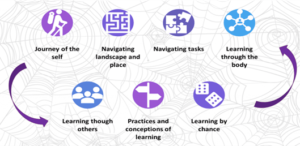
Rhetoric, guidance and regulation have shifted over time to firmly acknowledge all modes of learning as valid for social workers and other professionals. Much is said about recognising formal, informal, self-directed and even incidental learning for continuing professional development. However, reliance on, and value ascribed to, direct training, or organised learning activities are the default for many. There remains in my view a response in policy and organisational responses, to specific professional issues, a drive for tangible, measurable and visible learning opportunities of this type. The problem resulting from this is that some of the most significant learning experiences that social workers have can be the least acknowledged or valued.
There is an understandable dilemma for those involved in supporting social workers’ learning at local and national levels. Social work as a profession, role or task is characterised by multiple ambiguities. There are well documented challenges to how social work is articulated. Roles are multiple, diverse and dynamic. Every task has within it myriad sub-tasks that are often superbly complex and difficult to describe. If the role and task is difficult to describe, articulating how and what a social worker learns is more so. Further to that, planning how to facilitate or support that learning needs to wrestle with those ambiguities.
My recent research into the lived experiences of social workers’ learning through work led to me reconceptualising what is involved in workplace learning for social workers. Learning within this context is a complex web of key elements and interwoven threads, each web unique to the individual social worker. In terms of workplace learning, there are rich and diverse opportunities for social workers to learn through the direct work that they do. The study highlights that learning in social workers’ workplaces can be incredibly potent in relation to the kind of work they are doing, yet it is not a primary focus in planning for continuing professional learning.

Social workers’ learning in the workplace as a complex web (Ferguson, 2021)
Possible solutions to supporting workplace learning for social workers include acknowledging the intensity of the emotional and embodied aspect of social workers’ learning. Learning through direct work with real people who use services is also absolutely vital. Direct practice equips social workers with the kind of learning opportunities that they need to undertake the job they have. We need to understand and value learning through work tasks and consider how we allocate tasks to social workers that optimise learning.
The question is how can understanding the nature and complexity of individual social workers’ experiences help us design more effective workplace continuing professional learning opportunities. As part of this how do we increase the value and recognition of the kinds of significant learning that happens for social workers in their everyday work.
You can find out more about the research and findings here “When David Bowie created Ziggy Stardust” The Lived Experiences of Social Workers Learning Through Work (Ferguson, 2021).

Dr Gillian M. Ferguson
I’ve worked in diverse settings as social worker, community learning worker and various other roles in practice, HE and learning/development. Keen to be inspired and inspire others to learn. My doctoral research explored lived experiences of social workers learning through work.
